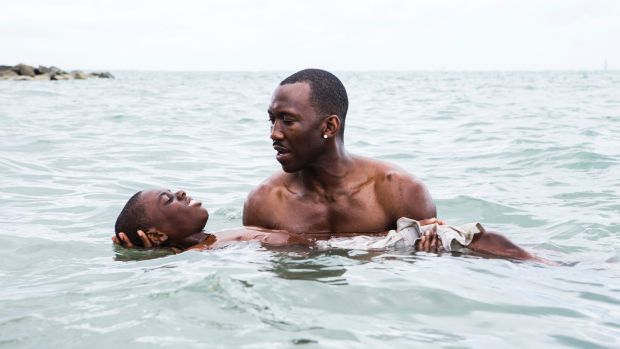★★★★★
(M), 111 minutes
Early on in Moonlight, the first essential film of 2017, a character recounts how they were once told, "In moonlight, black boys look blue." The line echoes through this shattering, vivid story: the blue can represent being an outsider, being unable to breathe or being depressed. The movie's many kinds of blue feel wrenched from the most personal of places and writer-director Barry Jenkins combines them with lyrical, incisive filmmaking.
More Trailers Videos
Trailer: Moonlight
Moonlight chronicles the life of a young black man from childhood to adulthood as he struggles to find his place in the world while growing up in a rough neighborhood of Miami.
Told in three chapters, Moonlight is the story of Chiron: an uncertain boy (Alex Hibbert), vulnerable teenager (Ashton Sanders) and a remote young man (Trevante Rhodes). Chiron grows up in Liberty City, an inner-city African-American community in Miami. At first, it's as if the words have been squeezed out of him – he can barely speak to Juan (Mahershala Ali), who rescues him from pursuing bullies, and his girlfriend Teresa (Janelle Monae).
Chiron lives in a poor neighbourhood in the 1990s, where crack cocaine is sold, mostly by Juan. But Juan is not merely a drug dealer, nor is Chiron's mother, the possessive, vituperative Paula (Naomi Harris), merely a crack addict. Moonlight transcends cinematic cliches about black America, as Jenkins uses snatches of classical music instead of gangsta rap and flourishes of technique that get closer at every turn to the character's humanity.

From the start, Chiron is struggling with who he is. Those around him seem to know he is gay before he does, and watching a child deal with a world that has judged him is heart-rending. Moments of tenderness intermingle with great pain. In high school Chiron is drawn to his garrulous friend Kevin (Jharrel Jerome) and they share an evening on a beach, the intimacy of which is thrown back in Chiron's face when Kevin publicly attacks him on a bully's orders.
The look on Sanders' face during the assault is one of regret, anger and even acceptance, and the film's emotional depths are repeatedly conveyed with a soulful physicality. The way Harris sets her shoulders when confronting her son encapsulates entire decades, while Jenkins captures the same look – looking upwards with but a hint of hope – from all three incarnations of Chiron.

The Chiron who returns to Miami as an adult is toughened, an echo of Juan, but the movie never settles for simple cause and effect. The boy and the teenager are still there, and this is a coming-of-age story in which the transformation never ceases. There's possibility in every moment, as you see when Chiron reconnects with the grown Kevin (Andre Holland), and those moments keep accumulating until Moonlight is an unforgettable vision of love and acceptance.













